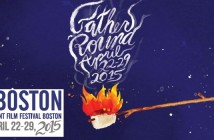Editor’s Notes: The following dispatch is part of our coverage of the Neuchâtel International Fantastic Film Festival. For more information visit nifff.ch and follow NIFFF on Twitter at @nifff.
If NIFFF’s main competition line-up is anything to be believed, New Zealand filmmakers are all but confirming their knack for light-hearted genre fare this year with the programming of What We Do in the Shadows—a relentlessly funny vampire mockumentary I expanded on in a previous dispatch—and now Gerard Johnstone’s Housebound. It might not impress much in terms of plot but, for the most part, it makes up for it thanks to the relentlessly playful approach it takes with regard to conventional tactics of horror filmmaking. Johnstone persistently keeps the film from veering into straightforward genre territory (as in: substituting scariness for humour as the film’s main objective) by defusing any sort of tension with a succession of jokes, more often than not on a parodic note. Some will surely regret that he at least not approach those horror aspects with a little more respect, but there’s something oddly appealing about the way Housebound flaunts any desire to even be remotely frightening. It almost plays like an exercise in irreverence. Now that isn’t to say that many of said-jokes don’t fall flat on their faces, but there are enough effective gags to obscure the fact that its haunted-house narrative is an indigestible mess. In truth, the plot’s weakness will likely barely register on the viewers’ entertainment scale, so secondary it is to the undermining of its countless twists.
…while The Canal’s visual polish makes it an infinitely more attractive proposition than it should be, it still doesn’t hold a candle to the myriad influences it panders to.
I deliberately choose to omit any coverage of the insipid Killers—whose wannabe aspirations to look and feel like the best Korean genre movies are undermined by the holy trio of weak script, unconvincing visuals and excessive length—in order to expand a little more on Ivan Kavanagh’s flawed, but obstinately intriguing, first film The Canal. Flawed in that this Irish indie-horror stumbles into many of « debut-film » trappings, with Kavanagh’s cinephilia made obvious in his throwing absolutely everything at both the screenplay and the film’s aesthetic. The story of the shattering of a film archivist’s perfect life after the death of his cheating wife, and the discovery that the walls of his house hide a morbid past, is delivered in a hectic frenzy, its plot too sinuous and hyperactive to engage its audience. There’s a sense that The Canal wants to be every horror film, from its archival-horror fascination with analog technology as a potential window into a world in-between, to giallo’s psycho-sexual tendencies. Add to that a protagonist whose credibility is progressively put in doubt and the terrifying J-horror-inflected water-soaked girl and you have an idea of how much range Kavanagh has crammed into 90 minutes. Jumping from one to another with as little coherence as can be mustered, all you can really do is sit back and take it in. The relinquishing of any qualms with plot by largely ignoring it allows for an appealing journey through the horror genre’s visual history. Piers McGrail’s cinematography persistently steals the show, displaying an accomplished palette in which he displays as much skill at the old-school scarlet-tinted Italian horror vibe as he does in capturing the guttural, cavernous underbelly of the eponymous canal and its vile digestive system. Nevertheless, as cult punk outfit Refused once sang, ‘good frames won’t save bad paintings’, and while The Canal’s visual polish makes it an infinitely more attractive proposition than it should be, it still doesn’t hold a candle to the myriad influences it panders to.
…if The Samurai is unlikely to convince the lowest common denominator, it can at least take pride in its being one of the most interesting films in this year’s line-up.
On the verge of being the first uniformly disappointing at the festival, my day took a glorious turn as The Samurai’s german director Til Kleinert took to the stage at a time when his nation’s football team were halfway through their ruthless 7-1 humiliation of the World Cup’s hosts, a tremendously agitated and excited figure who could barely wait to get back to the big screens outside the theater. As if things couldn’t get any better for the man, his film was warmly received by the habitually rather conservative crowd of NIFFF’s genre aficionados. Operating at a frantic pace, The Samurai tells the story of one police officer’s night chasing a gown-wearing, katana-wielding man through a quiet rural town as the latter wreaks havoc, decapitates people and gradually starts to question the law enforcer’s sexuality. Genre cinema has historically proved itself a particularly fertile ground for subversive social and sexual issues, but rarely is something that would have otherwise been subtext so explicitly voiced. Jakob (our protagonist) transforms from a pedantic stuck-up loner into an entirely new beast, one brimming with newly-discovered self-respect and pride, triggered by the incessant provocations of a psychopathic killer who holds his weapon in one hand, and a figurative mirror in the other. Stylistically, The Samurai bares little to no ties to traditional genre codes, its drastic tonal shifts conferring it with something of an ungraspable quality. Indeed, not unlike its villain, the film is an elusive beast, a fascinating reminder of the baffling absence of queer sensibilities in the desperately machistic world of genre cinema. The clever minimalism of having its narrative composed almost solely of a fascinating « return of the repressed » character arc, the unbridled rhythm, the darkly bizarre mood… if The Samurai is unlikely to convince the lowest common denominator, it can at least take pride in its being one of the most interesting films in this year’s line-up. If anything, it will surely succeed in triggering discussion about what areas genre still has to explore, and how to create something fresh in the otherwise murky cesspool of horror’s sterile circlejerk.




